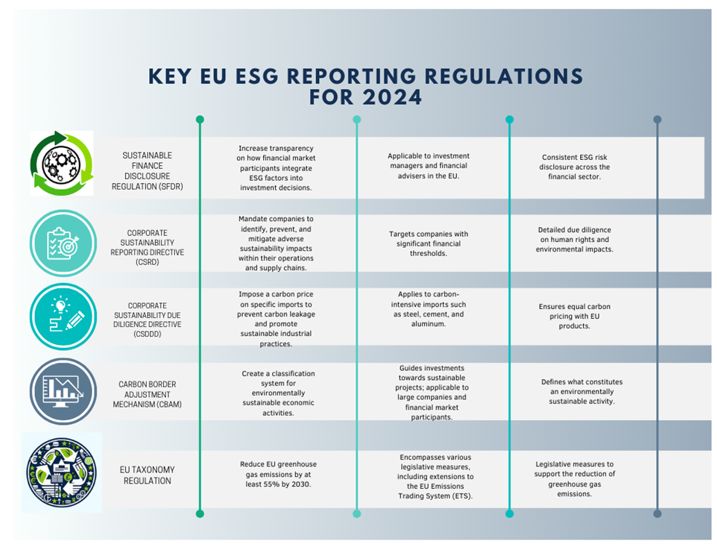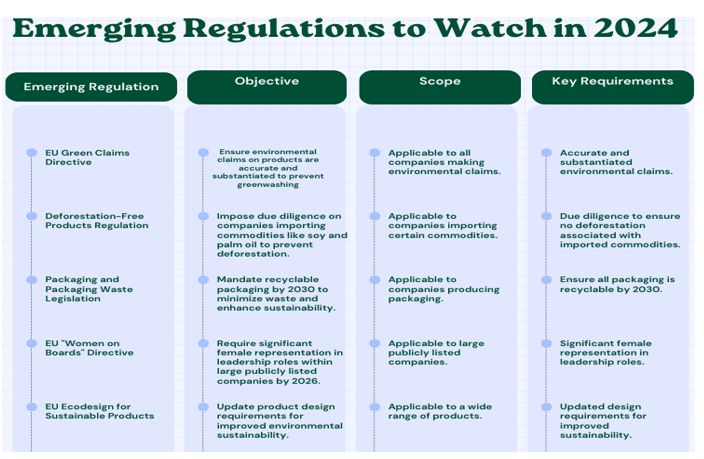Imagine a world where legal firms are not just advisors but visionaries, guiding businesses through a transformative journey that intertwines profitability with purpose. In this evolving business environment, the integration of Environmental, Social, and Governance (ESG) principles is no longer optional—it's a game-changer. ESG transcends traditional business practices, offering a holistic approach that not only meets regulatory demands but also drives innovation, competitiveness, and long-term value for clients.
The roots of ESG can be traced back to the early 2000s when socially responsible investing gained traction, driven by ethical and sustainability concerns. Since then, ESG has evolved into a comprehensive framework encompassing three crucial dimensions, each offering unique opportunities and challenges for businesses and legal firms alike::
- E-Environmental: This dimension underscores the critical need for companies to address climate change, pollution, resource depletion, and biodiversity conservation. In recent years, heightened awareness of environmental issues, coupled with scientific evidence, has propelled environmental sustainability to the forefront of corporate agendas. Companies are increasingly scrutinized for their environmental impact, not only by regulators but also by consumers, investors, and civil society. As a result, firms are compelled to adopt sustainable practices to mitigate risks, enhance resilience, and drive innovation. From reducing carbon emissions and improving energy efficiency to implementing sustainable supply chain practices, environmental considerations have become central to corporate strategy.
- S-Social: Social considerations encompass a wide range of issues, including labour practices, diversity and inclusion, human rights, community engagement, and philanthropy. The social dimension of ESG reflects the broader societal impacts of business activities, emphasising the importance of responsible corporate behaviour. In an era marked by increasing social inequality, discrimination, and geopolitical tensions, stakeholders are demanding greater accountability and transparency from companies. Employees, customers, investors, and communities expect businesses to uphold ethical standards, respect human rights, and contribute positively to society. Firms that prioritise social responsibility not only build trust and goodwill but also strengthen their competitive advantage and long-term sustainability.
- G-Governance: Governance encompasses corporate governance structures, board diversity, executive compensation, transparency, and ethical conduct. Effective governance is essential for promoting integrity, accountability, and long-term value creation. Historically, governance issues such as executive pay disparities, boardroom conflicts, and accounting scandals have eroded shareholder trust and undermined corporate reputation. In response, regulators have introduced stricter governance standards and disclosure requirements to enhance transparency and accountability. Moreover, investors are increasingly scrutinizing companies' governance practices as part of their investment decision-making process. Firms with robust governance frameworks not only mitigate legal and regulatory risks but also attract investment capital and foster stakeholder confidence.
The Role of Legal Firms in ESG Integration
In this narrative, legal firms emerge as pioneers of change, seamlessly integrating ESG principles into their ethos. Firm leaders assume the role of visionary conductors, inspiring their teams to embrace this transformation and chart a course towards sustainability and success.
Client-Centric Approach
Central to this journey is a profound Client-Centric Approach. Legal firms actively listen to their clients, discerning their desire for ESG-centric services. Through tailored guidance and innovative solutions, they foster relationships that transcend mere legal advice, resonating deeply with their clients' aspirations.
Yet, it is within the realms of Innovation and Collaboration that the true magic unfolds. ESG presents not just challenges but fertile ground for legal firms to reimagine their role, collaborating closely with clients to pioneer transformative solutions. By engaging stakeholders from diverse backgrounds, they catalyze positive change and redefine the boundaries of possibility.
The Synergy of Compliance Officers and Lawyers
At the heart of this narrative are the pivotal roles played by Compliance Officers and Lawyers. Their synergy forms the backbone of successful ESG integration, leveraging their expertise to navigate the complexities of this new paradigm. Compliance Officers, with their meticulous attention to detail, ensure adherence to regulations, while Lawyers craft strategies that not only mitigate risks but also unlock avenues for growth and innovation.
Together, Compliance Officers and Lawyers forge a formidable alliance, seamlessly embedding ESG principles into every facet of legal practice. They evolve beyond mere advisors, becoming strategic partners in their clients' ESG journey. As they lead by example, they shape not only the future of legal practice but also a future that is sustainable, inclusive, and promising for generations to come.
Incorporating ESG into a legal firm's DNA transcends business strategy; it embodies a transformative journey towards a brighter, more sustainable future. By embracing this journey, legal firms not only adapt but thrive, leaving an indelible mark on the landscape of corporate responsibility and forging a legacy of enduring impact.
Key EU ESG Reporting Regulations for 2024
Now that we've explored how legal firms can thrive by embracing ESG principles, let's explore the key EU ESG reporting regulations set to reshape corporate accountability and transparency in 2024:

Emerging Regulations to Watch in 2024

These regulations, along with emerging directives, are set to redefine corporate responsibility and sustainability practices. As the world witnesses the dawn of a new era in corporate responsibility, legal firms stand at the vanguard, poised to lead by example. Through collaboration, innovation, and unwavering commitment, they carve a path towards a sustainable future—a future where businesses thrive not at the expense of the planet and society but in harmony with them. The legacy of these visionary legal firms will endure—a testament to their unwavering dedication to the principles of ESG, and their profound belief in the power of law to shape a world where profit and purpose converge, and where the pursuit of excellence is synonymous with the pursuit of sustainability.
The content of this article is intended to provide a general guide to the subject matter. Specialist advice should be sought about your specific circumstances.


